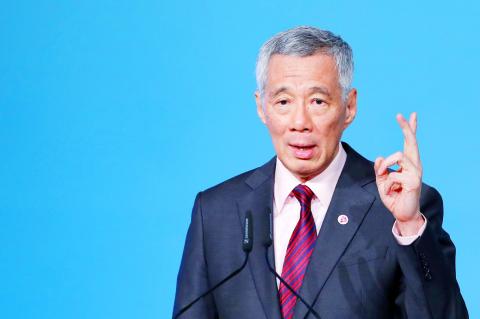Southeast Asian countries would work more closely with new powers China and India to counter the pressure of protectionism and ensure continued growth, Singaporean Prime Minister Lee Hsien Loong (李顯龍) said on Saturday.
Addressing the summit of the 10-member ASEAN, Lee said that regional economic growth was under threat because the political mood in many countries had turned against free trade.
He said trade tensions between the US and China in particular are worrying.

Photo: EPA
The US and China are entangled in their most consequential trade dispute since World War II. Both countries have proposed tariffs of US$50 billion on each other’s products. US President Donald Trump is looking to impose tariffs of up to US$100 billion more on Chinese goods.
“The global strategic balance is shifting, and so is the regional balance,” Lee said. “New powers, including China and India, are growing in strength and influence. This has opened up new opportunities for ASEAN member states as we expand our cooperation with them.”
In a statement on Saturday, ASEAN leaders affirmed the need for peace in the South China Sea, where the bloc is currently negotiating a set of rules with China to avoid conflicts arising from a bitter territorial dispute pitting some members against Beijing’s vast claims to the strategic waterway, where Taiwan also has claims.
They also encouraged Myanmar and Bangladesh to press on with their “shared commitment to carry out the voluntary return” of about 700,000 Rohingya Muslims who have fled Myanmar’s Rakhine State, Lee said.
The leaders also welcomed a historic summit between North Korean leader Kim Jong-un and South Korean President Moon Jae-in as a first step toward reducing tensions on the Korean Peninsula.
“It’s a positive step — it’s better than firing missiles and testing bombs — but how does it go? That’s something which we will wait and see and which we can only hope for the best,” Lee said.
To fight protectionism, Lee said ASEAN would like to conclude negotiations this year on the Regional Comprehensive Economic Partnership, a proposed free-trade agreement between ASEAN and Australia, China, India, Japan, South Korea and New Zealand.
In addition to Singapore, the ASEAN members are Myanmar, Cambodia, Laos, Indonesia, Thailand, Malaysia, Vietnam, Brunei and the Philippines.

The CIA has a message for Chinese government officials worried about their place in Chinese President Xi Jinping’s (習近平) government: Come work with us. The agency released two Mandarin-language videos on social media on Thursday inviting disgruntled officials to contact the CIA. The recruitment videos posted on YouTube and X racked up more than 5 million views combined in their first day. The outreach comes as CIA Director John Ratcliffe has vowed to boost the agency’s use of intelligence from human sources and its focus on China, which has recently targeted US officials with its own espionage operations. The videos are “aimed at

STEADFAST FRIEND: The bills encourage increased Taiwan-US engagement and address China’s distortion of UN Resolution 2758 to isolate Taiwan internationally The Presidential Office yesterday thanked the US House of Representatives for unanimously passing two Taiwan-related bills highlighting its solid support for Taiwan’s democracy and global participation, and for deepening bilateral relations. One of the bills, the Taiwan Assurance Implementation Act, requires the US Department of State to periodically review its guidelines for engagement with Taiwan, and report to the US Congress on the guidelines and plans to lift self-imposed limitations on US-Taiwan engagement. The other bill is the Taiwan International Solidarity Act, which clarifies that UN Resolution 2758 does not address the issue of the representation of Taiwan or its people in

SHIFT: Taiwan’s better-than-expected first-quarter GDP and signs of weakness in the US have driven global capital back to emerging markets, the central bank head said The central bank yesterday blamed market speculation for the steep rise in the local currency, and urged exporters and financial institutions to stay calm and stop panic sell-offs to avoid hurting their own profitability. The nation’s top monetary policymaker said that it would step in, if necessary, to maintain order and stability in the foreign exchange market. The remarks came as the NT dollar yesterday closed up NT$0.919 to NT$30.145 against the US dollar in Taipei trading, after rising as high as NT$29.59 in intraday trading. The local currency has surged 5.85 percent against the greenback over the past two sessions, central

US Indo-Pacific Commander Admiral Samuel Paparo on Friday expressed concern over the rate at which China is diversifying its military exercises, the Financial Times (FT) reported on Saturday. “The rates of change on the depth and breadth of their exercises is the one non-linear effect that I’ve seen in the last year that wakes me up at night or keeps me up at night,” Paparo was quoted by FT as saying while attending the annual Sedona Forum at the McCain Institute in Arizona. Paparo also expressed concern over the speed with which China was expanding its military. While the US